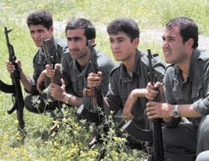Entered into the database on Saturday, May 13th, 2006 @ 13:31:11 MST
COVERT FORCES IN IRAN TRAINING KURDISH REBELS Behind the increasingly shrill rhetoric and saber rattling over Iran’s
nuclear ambitions America and Israel are engaged in a secret war against Iran
that has echoes of the years when the CIA supported the Afghan mujahideen against
the Soviet Union. This time, the United States and Israel are running covert operations with
the help of Kurdish militias and rebel Iranian fighters. For some observers,
training and arming Islamic fighters smacks of the days of Soviet rule in Afghanistan.
Then, the Soviet army, which was the second most powerful military in the world,
was defeated by Islamic militants, including men like Osama bin Laden. Now the U.S. military, with Israeli commandos lending a hand, is arming and
secretly training a different breed of mujahideen, or Islamic fighters—Kurdish
militias with links to ethnic Kurdish communities in Iran and Syria, and fighters
from the Iranian Mujahideen-e-Khalq (MEK), which has bases in southern Iraq
and has provided the United States with information about the Iranian military
and Iran’s nuclear sites. From the perspective of Washington and Tel Aviv, the history of the Kurds makes
them ideal recruits for a covert war against Iran and Syria. During and after Saddam Hussein’s rule, the Kurds of northern Iraq longed
for an independent Kurdistan. When the so-called “no-fly zone” was
in place over Iraq, the Kurds had protection from the U.S. Air Force and U.S.
allies. That enabled them to build a large militia force and to develop a burgeoning
economy. But, since the fall of Saddam the Kurds have become disillusioned with the
country’s slide into chaos and have hinted that they would be happy to
see Iraq divided into three parts. In that event, they would establish an autonomous
region called Kurdistan and the rich northern oil fields of Kirkuk would ensure
their prosperity for decades to come. Not everyone favors creation of an independent Kurdistan. The Turks, Iranians
and Syrians are united in a belief that it would generate instability by encouraging
large ethnic Kurdish communities in their countries to demand separation and
an alignment with Iraq’s Kurds. In the 20th century ethnic Kurdish demands for autonomy led to more than 30,000
of them being slaughtered by the Turks. In Iran, they were brutally suppressed
in three provinces they dominated. As part of a covert scheme to destabilize and soften up the Iranian regime
for possible Special Forces attacks on Iranian nuclear facilities, Washington
has turned to disaffected Iranian Kurds for help and to Iranian dissidents in
the MEK. Using fighters trained by the United States in secret bases in southern Iraq,
the MEK has carried out a series of attacks in Iran. In recent months, there
has been increasing instability inside three Iranian provinces dominated by
Kurds, as well as attacks on Iranian troops near the border with Iraq. A Kurdish
guerrilla group claimed responsibility for two of the attacks, saying they were
in retaliation for Iranian shelling into Kurdish areas of northern Iraq. New York journalist Seymour Hersh claimed in December 2005 that U.S. combat
troops were already in Iran. Following that report, there was an incident near
the Iran-Iraq border in January when an Iranian military cargo plane carrying
10 top Iranian Revolutionary Guard commanders mysteriously crashed. Later, there
were rumors it was brought down by U.S. Special Forces within Iran. In April 2006, Iran said it shot down a U.S. surveillance drone flying over
the country. Israel has been running its own black operations with the help
of Kurds it has trained. The Kurds reportedly have strong ties to Israel because
it supports the creation of an independent Kurdistan. From an Israeli perspective,
such an entity would provide Israel with an ally in a region in which it is
totally isolated and would keep Iraq destabilized. It was Israel’s neo-con friends in Washington who once believed a new
Iraq would be Israel’s best ally, but the more that vision has turned
to nightmare, the more Israel has looked to the creation of a separate Kurdish
state in Iraq as the next best thing. Israel’s relationship with the Kurds goes back a long way. During the
Iran-Iraq war, the Israelis supplied the Kurds with weapons to attack Saddam
Hussein’s forces. Then, after the first Gulf War, when the United States
and its allies abandoned the Kurds, Israel continued to provide them with weapons
and training. To that end, Israeli special forces and Mossad have been training and recruiting
Kurds for clandestine operations and surveillance in Iran and Syria. The advantage
of having Kurdish fighters carry out operations is that they can easily blend
into ethnic Kurdish communities and sow dissent. They can also recruit rebel elements and build bases for future operations.
Kurdish militiamen and fighters from the MEK are seen by Israel as ideal insurgents.
Richard Walker is the nom de plume of a former mainstream
news producer who now writes for AFP so he can expose the kinds of subjects
that he was forbidden to cover in the controlled press.
